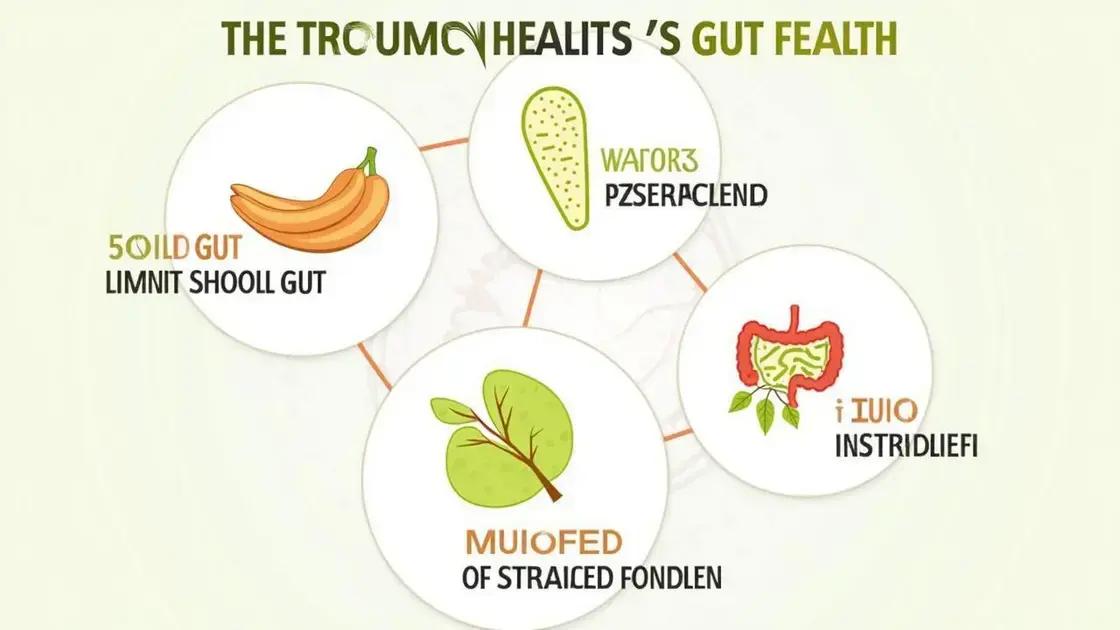The shift toward fermented foods boosts gut health and testosterone levels by introducing probiotics that improve digestion, enhance nutrient absorption, and promote a balanced gut microbiome. Incorporating foods such as yogurt, kimchi, and kombucha into your diet can yield significant health benefits.
Fermented foods are gaining popularity for their numerous health benefits, particularly for gut health and testosterone balance. As more people seek natural solutions to improve well-being, this shift highlights the potential of fermented foods in supporting overall health. In this article, we will explore the various types of fermented foods, their effects on gut health, and how they may influence testosterone levels, providing practical tips on incorporating these foods into your diet.
Understanding Fermented Foods

Fermented foods are foods that have undergone fermentation, a natural process where microorganisms like bacteria and yeast break down sugars. This process enhances the food’s flavor, texture, and nutritional value.
Common examples of fermented foods include yogurt, kimchi, sauerkraut, kefir, and kombucha. These foods are rich in probiotics, which are healthy bacteria that can aid digestion and improve gut health.
How Fermentation Works
During fermentation, microorganisms convert starches and sugars into acids or alcohol. This process not only preserves the food but also creates beneficial compounds. For example, lactic acid bacteria in yogurt help to digest lactose, making it easier for people who are lactose intolerant to enjoy dairy.
Nutritional Benefits
Fermented foods are often packed with vitamins, minerals, and antioxidants. They can enhance nutrient absorption in the body. Many fermented foods also contain bioactive peptides and fatty acids that may offer additional health benefits.
Incorporating a variety of fermented foods into your diet can increase the diversity of beneficial bacteria in your gut. This diversity is crucial for maintaining a healthy microbiome.
Conclusion on Fermented Foods
Understanding fermented foods and their benefits is key to harnessing their power for health. By embracing these foods, individuals can enhance their gut health, support their digestive system, and improve their overall well-being.
Benefits for Gut Health

Fermented foods offer numerous benefits for gut health. One major benefit is the presence of probiotics, which are live bacteria that promote a healthy digestive system. These probiotics help balance the gut microbiome by increasing the number of beneficial bacteria.
A healthy gut microbiome can improve d digestion and nutrient absorption. When the balance of good bacteria is maintained, it helps prevent digestive problems such as bloating, gas, and constipation.
Boosting the Immune System
Fermented foods can also boost the immune system. Approximately 70% of the immune system is located in the gut. Probiotics found in foods like yogurt and sauerkraut can enhance the body’s ability to fight off infections and illnesses.
Reducing Inflammation
In addition, consuming fermented foods may reduce inflammation in the gut. A healthy gut leads to lower inflammation levels in the body, which can improve conditions like irritable bowel syndrome (IBS) and other gastrointestinal disorders.
Improving Mental Health
There is a connection between gut health and mental health. Fermented foods can positively influence mood and mental clarity. The gut produces neurotransmitters like serotonin, which play a crucial role in regulating mood. Therefore, improved gut health can support better emotional well-being.
Impact on Testosterone Levels

Fermented foods may have a positive impact on testosterone levels, which is crucial for various bodily functions, including muscle growth, mood regulation, and overall health. Research suggests that the gut microbiome plays a significant role in hormone regulation, including testosterone.
Consuming fermented foods can help maintain a healthy gut microbiome. A balanced gut can enhance the body’s ability to produce hormones, which may lead to increased testosterone levels. Probiotics found in foods like kefir and kimchi support this hormonal balance.
Reducing Aromatase Activity
Another way fermented foods may influence testosterone is by reducing the activity of an enzyme called aromatase. Aromatase converts testosterone into estrogen, which can lower testosterone levels if overactive. Some studies indicate that probiotics can help regulate this enzyme, potentially protecting testosterone levels.
Supporting Healthy Body Composition
Maintaining a healthy body composition is also important for testosterone production. Fermented foods can aid in weight management and fat loss by improving gut health and digestion. Lower body fat levels are associated with higher testosterone levels.
The Role of Nutrients
Fermented foods often contain essential nutrients, such as zinc and vitamin D, which are important for testosterone production. Having a diet rich in these nutrients can support healthy hormone levels. Including a variety of fermented foods can contribute to an overall healthier diet.
Practical Ways to Incorporate Fermented Foods

Incorporating fermented foods into your diet can be easy and fun. Here are some practical ways to add these nutritious foods into your meals:
1. Start with Breakfast
Add yogurt or kefir to your morning routine. You can enjoy it plain or mix it with fruits, nuts, or honey for added flavor. Try using kefir in smoothies for a creamy texture and probiotic boost.
2. Snack Smart
Choose fermented snacks instead of processed ones. Look for options like pickles, kimchi, or fermented olives. These snacks are not only crunchy and delicious but also provide beneficial probiotics.
3. Upgrade Salads
Incorporate kimchi or sauerkraut into salads. These fermented toppings add a unique flavor and a probiotic punch. Adding a side of fermented vegetables can enhance any meal and improve gut health.
4. Experiment with Soups
Use miso or kimchi in soups. Miso soup is a classic Japanese dish rich in flavors and probiotics. Adding fermented ingredients to your favorite soups can make them more nutritious.
5. Try Fermented Beverages
Consider trying kombucha or kvass as a refreshing drink option. These beverages are tasty and can be a great alternative to sugary drinks. They can also enhance your gut health significantly.
6. Make Your Own
Try making your own fermented foods at home. Simple recipes for sauerkraut or pickles can be found online. Home fermentation can be satisfying and allows you to customize flavors to your liking.
Embracing the Benefits of Fermented Foods
The shift toward fermented foods offers a significant opportunity to improve gut health and maintain testosterone balance. By understanding these foods and their effects, you can harness their benefits effectively.
Incorporating fermented foods into your diet can improve digestion, boost your immune system, and even enhance your hormone levels. With practical ways to include these foods in your meals, you can make healthy choices enjoyable and accessible.
Whether it’s through simple breakfasts, snacks, or homemade ferments, the positive impacts on your health can be profound. Embracing fermented foods is not just a trend but a beneficial lifestyle change that can lead to lasting health improvements.
FAQ – Frequently Asked Questions about Fermented Foods
What are fermented foods?
Fermented foods are products that have undergone fermentation, where bacteria or yeast break down sugars, enhancing flavor and nutritional value.
How do fermented foods benefit gut health?
Fermented foods contain probiotics that promote a healthy gut microbiome, improving digestion and nutrient absorption while boosting the immune system.
Can fermented foods improve testosterone levels?
Yes, consuming fermented foods may help maintain testosterone levels by promoting a healthy gut, reducing aromatase activity, and supporting a balanced diet.
How can I incorporate fermented foods into my diet?
You can add fermented foods to your meals through breakfast items like yogurt, snacks like pickles, salads, soups, and try fermented beverages like kombucha.
Are there any homemade options for fermented foods?
Absolutely! You can make your own fermented foods at home, such as sauerkraut and pickles, using simple recipes found online.
What types of fermented foods should I try?
Some popular fermented foods include yogurt, kefir, kimchi, sauerkraut, tempeh, and kombucha—all are nutritious and beneficial for health.













